The Indian comic in jail for jokes he didn't crack
- Published
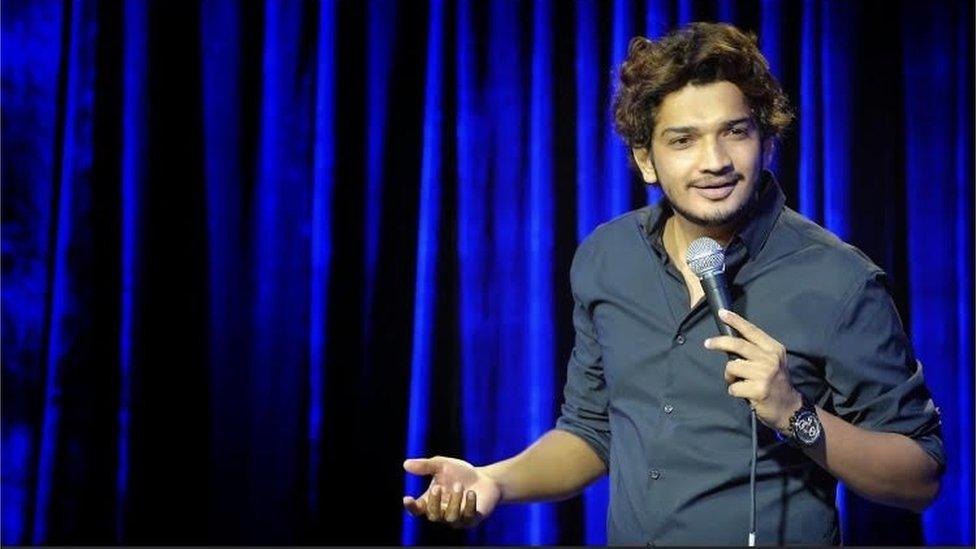
Mr Faruqui has spent 25 days in prison for jokes he evidently "didn't make".
In one of his shows, stand-up comic Munawar Faruqui cracks a dark joke about his native Gujarat state and the deadly religious riots of 2002.
"Junagadh is a very lazy city. People go for siestas, shops shut, nothing happens," Faruqui says of his hometown, a former princely state.
The comic, who is Muslim, says when he was a boy he was stuck at home for 12 days during a curfew in his mixed neighbourhood. A Hindu friend of his mother's was their only occasional company.
"We were eight kids in the house. I was happy because I didn't have to go to school. The electricity used to go, the phones went dead, the elders in the house were anxious about their safety. But when the riots ended, [we found] nobody died in Junagadh.
"You know why? People were too lazy to even riot."
The same couldn't be said of other parts of the state. More than 1,000 people, most of them Muslims, were killed when riots erupted after a train fire killed 60 Hindu pilgrims.
Faruqui, now 30, is part of India's evolving youthful and lively comedy scene. It's still rough around the edges and sometimes callow, but it bristles with energy and ambition and is unwilling to pull its punches. More importantly, it has begun to draw an audience who are willing to pay for an evening of jokes even from a relative newcomer like Faruqui. The problem is that not everybody appreciates a joke in India.
That's why the comic has spent 28 days in prison for jokes he plainly didn't make.
On the evening of 1 January, he was kicking off a 14-city tour with a ticketed show in a café in the central Indian city of Indore. A leader of a local Hindu fringe group had arrived and stopped the show, complaining that the comic was "insulting" Hindu religious sentiments. Indore is a prominent city in Madhya Pradesh, which is ruled by the Hindu nationalist BJP. Hindus make up the vast majority of India's population.
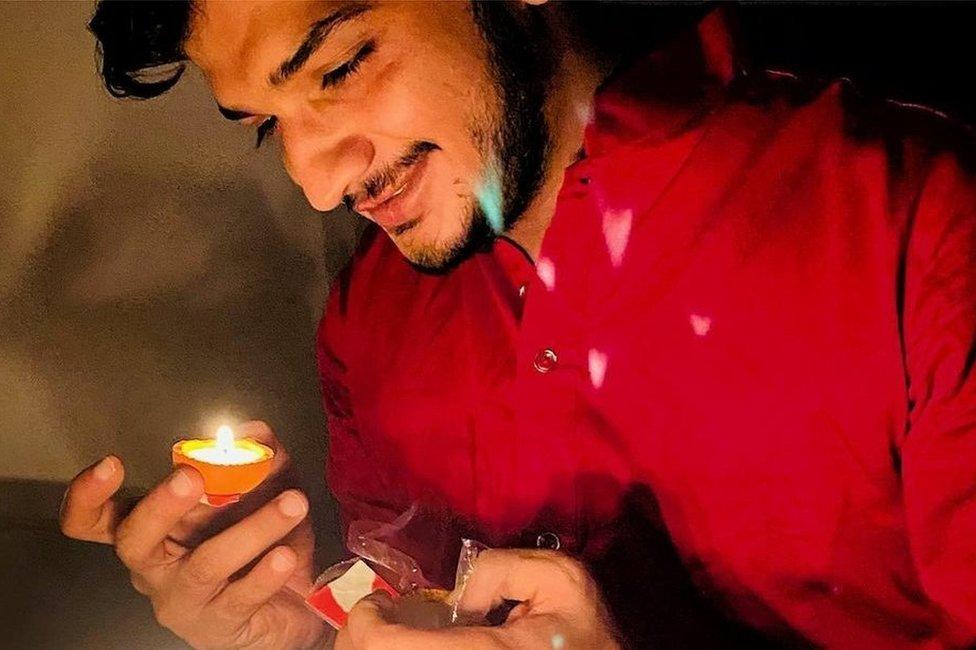
The police say they have no evidence that Munawar Faruqui cracked offensive jokes
In a mobile phone video recorded by an audience member, Faruqui is seen pleading with Eklavya Gaud, the son of a ruling BJP politician, that he also jokes about Muslims in his shows and that he should be allowed to continue. "I just want to make people laugh. If anyone feels offended I will never do it again," he tells Mr Gaud.
"Let the show begin," scream impatient audience members.
"Hindu-Muslim bhai bhai" [Hindus and Muslims are brothers]," a woman in the audience is heard telling Mr Gaud.
According to reports, Mr Gaud left the show in minutes and called in the police. That night Munawar Faruqui and four others, including another comic, were arrested and charged with outraging religious feelings and performing a "negligent act likely to spread infection of diseases dangerous to life", alluding to the pandemic.
"He's a serial offender. He has made indecent remarks on Hindu gods and goddesses in the past," Mr Gaud told reporters later. Last July, a lawyer had filed a case against Faruqui in Uttar Pradesh, external state for allegedly making derogatory remarks against federal home minister Amit Shah and hurting Hindu religious sentiments in different videos.
Eyewitnesses told reporters that Faruqui had not cracked any jokes relating to religion , externalwhen he was picked up, and that he hadn't even started his routine when Mr Gaud stopped the show. The police later admitted they had no evidence , externalthat the comic had done so, and that the complainant had "overheard some jokes" that the comic was preparing for the show.
"He was arrested for jokes he didn't crack. Munawar hadn't even begun the show when he was interrupted. A presumption of and anticipation of a so-called criminal act cannot be an offence. The police registered a case and arrested him without verifying the facts," Anshumaan Shrivastava, the comic's lawyer, told me.
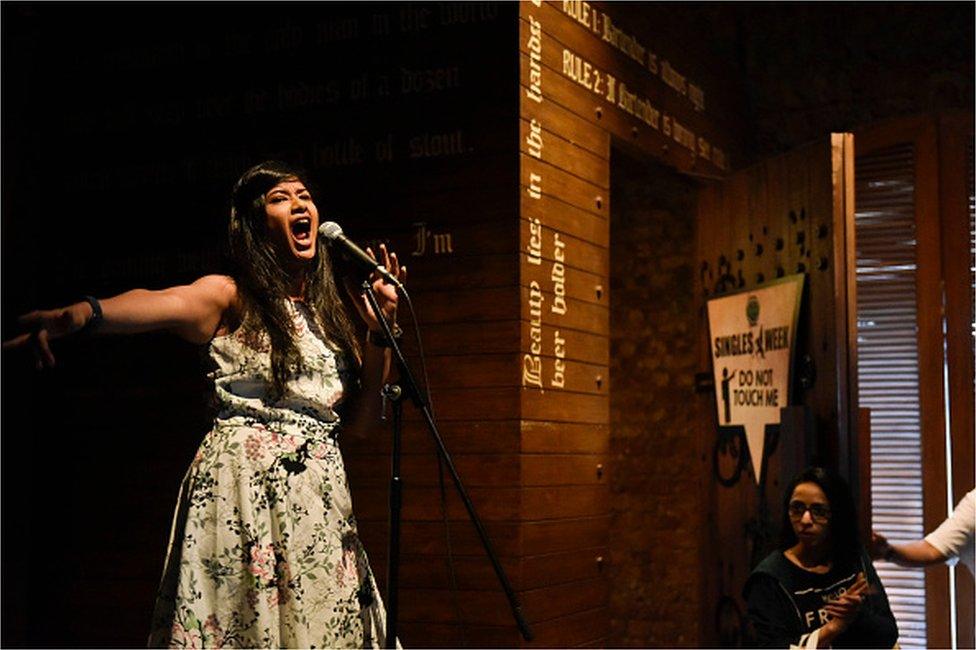
The stand-up comedy scene is booming in India
Two lower courts have refused to give him bail. On Thursday, the high court in Madhya Pradesh rejected a fresh plea, saying the "investigation is in progress... and the possibility of collecting more incriminating material... cannot be ruled out". The police say releasing the comic would lead to a "law and order situation", although it is not clear how. "This will have a chilling effect on comedians. They will be constantly forced to police themselves," Amit Varma, a writer and podcaster, told me. "Stand-up comics will now tend to stay away from politics."
On stage Faruqui is a smiling, personable figure with a sense of whimsy. He's also a work in progress. He mines contemporary Indian realities for his jokes and often laces his observational humour with expletives. He's an equal opportunity provocateur, poking fun at all religions. He's also a rapper, and in a breezy video, he sings about stereotypes about a Muslim ghetto in Mumbai. He has half-a-million subscribers on his YouTube channel, and is swiftly gaining followers on Instagram as well.
In his shows, Faruqui serves up a breathlessly eclectic range of jokes, some of which sound half-finished. But there's no dearth of confidence. He makes fun of Punjabi pop music which portray women as "gold diggers". He says every social media platform in India eventually "becomes a dating platform". On one show, he says: "If your girlfriend wants anything from you, just give it to them, don't try songs about it". He takes playful digs at the government, saying it is "responsible for wasting water" by using water cannons on protesting farmers.
Often, Mr Faruqui's jokes are quirky and dark.
In one show, he tells the audience a joke of how his father found a notebook where had jotted some notes on how to make a bomb.
"He threw the notebook at me and asked me who's been teaching you all this? The main item is missing here, he said. And that was, political support [to make a bomb]." The audience cheers in approval.
Amit Varma says: "I really like him. For someone so young, he has an evolved sense of comedy and black humour, and also knows how to connect emotionally with the audience. He makes fun of everyone, he is honest and refreshing."
Fellow comedians have come out in support of Faruqui. On his YouTube channel followers have posted messages of solidarity. "Don't see if you don't like," says one. His arrest is being seen as the latest assault on freedom of speech in India, encouraged by vigilante activism by Hindu mobs and exacerbated by trolling by online armies on social media. Last year, at least half-a-dozen comics apologised, external for hurting religious sentiments.
Jaideep Varma, a filmmaker who made I Am Offended, a documentary on stand-up comedy in India, says provocation is an essence of stand-up comedy, and Faruqui is no exception. "But they will only do their best if they are not gagged. So being pragmatic may be the way to go from there - as of now the band of subjects that get people inflamed is fairly narrow. It may be worth avoiding that and expanding the space for comedy from other sides."
Stand-up comedian Sanjay Rajoura believes Faruqui's imprisonment should worry all Indians. "In a civilised society, such brazen acts have no place, external. If you don't like it, don't go for it."
"For now," says Rajoura, "the joke has been incarcerated in India."
Comedienne Aditi Mittal, 26, describes her experience as a woman in the world of comedy
Related topics
- Published24 June 2018
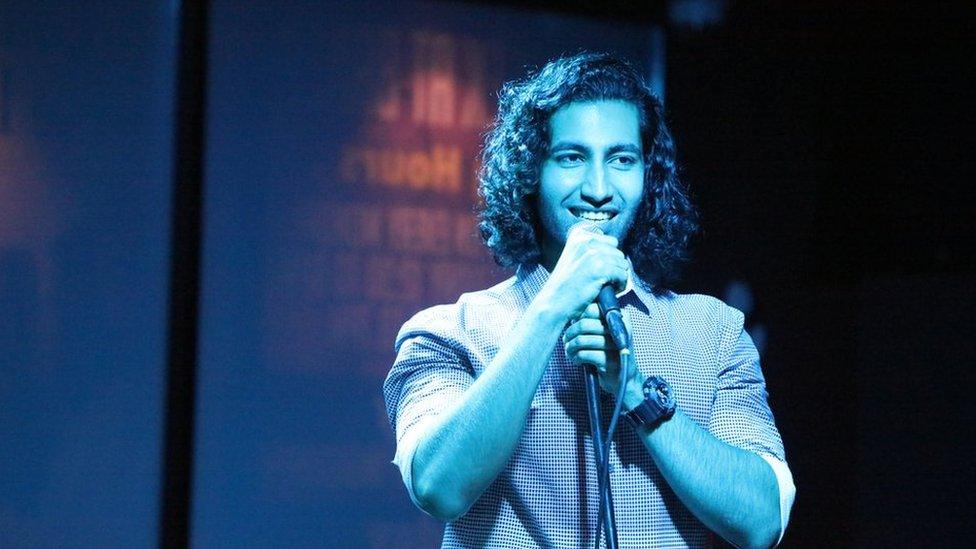
- Published23 November 2011
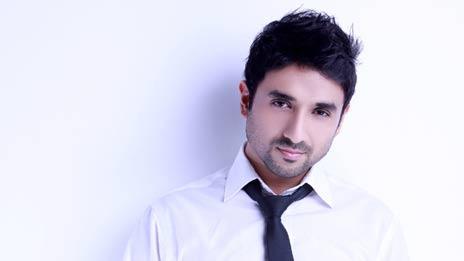
- Published30 May 2013

